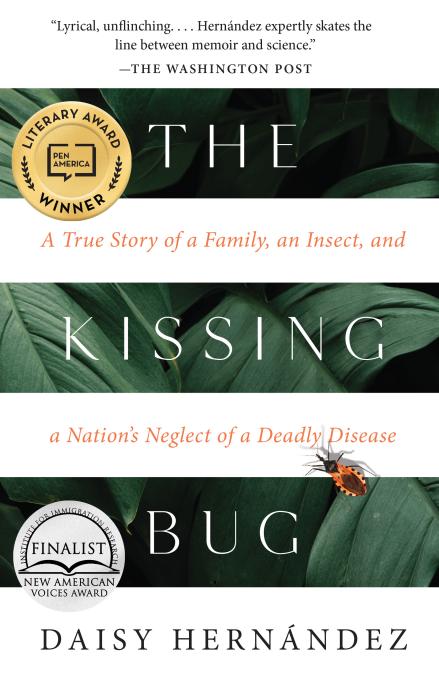
Daisy Hernández is the author of The Kissing Bug: A True Story of a Family, an Insect, and a Nation’s Neglect of a Deadly Disease, which won the 2022 PEN /Jean Stein Book Award and was selected as an inaugural title for the National Book Foundation’s Science + Literature Program. She is also the author of the award-winning memoir A Cup of Water Under My Bed and coeditor of Colonize This! Young Women of Color on Today's Feminism. Daisy is an Associate Professor in the English Department at Northwestern University. TIR intern Victor Resendiz talked with Hernández via email about " Soursop," her story in issue 51/2 of The Iowa Review, and The Kissing Bug.

Victor Resendiz: What got you into writing? Was there a special moment when you realized you wanted to be a writer?
Daisy Hernández: I knew in middle school, probably around fifth grade. My science class gave us an assignment to write an essay arguing for why there might be life on other planets. I already felt like an alien in my white hometown in New Jersey and my uncle had a card identifying him as a resident alien. So why couldn’t there be alien life? Why couldn’t other planets be teeming with all sorts of creatures? My teacher loved the essay I wrote, and she read it aloud to the class, and when I saw how the students were nodding their heads and taking in my words—well, it was the first time I experienced a sense that I had power. Until then, I felt like I had no power. I couldn’t change the financial realities of my working-class immigrant family. I couldn’t change the way teachers and other authority figures looked at my parents for not speaking English. There was so much about the world that left me powerless. But that day in science class I had words. And my words could reach people and move them. I never looked back.
VR: In “Soursop,” the short story you published in the most recent Iowa Review, and your 2021 nonfiction book The Kissing Bug: A True Story of a Family, an Insect, and a Nation’s Neglect of a Deadly Disease, you’ve presented two incredible narratives of the families changed by Chagas, a life-threatening heart disease spread by parasitic insect bites. You’ve used both short story and nonfiction filled with research and your personal family history to explore the topic. Why write about Chagas in both fiction and nonfiction? Do you see these different mediums serving different functions when talking about Chagas?
DH: The nonfiction book actually started as the short story! But as I wrote “Soursop,” I began doing research on Chagas disease and then I realized that I knew so little about this disease in whose shadows I had spent my childhood. I began writing nonfiction because, well, so much of childhood honestly felt like half-fictions. Migration, political exile, and colonialism made it impossible for me to feel that I had a cohesive story of my own family. There was so much my parents didn’t speak about, and so much that my own auntie spun stories about. So I needed facts. I craved facts. That took me on a seven-year journey to write a nonfiction book about Chagas disease.
When I was done with the book, I returned to the short story for a simple reason: I loved the characters. They felt real to me even though they are not based on anyone I know. The mother is not my auntie who died of Chagas disease. The mother is her own person, so to speak.
Nonfiction gives me, as a writer, the pleasure of working with both art and fact. Fiction gives me the pleasure of falling in love with characters, of becoming obsessed with them. It’s a very different experience of writing for me.
VR: In “Soursop,” a young girl sees Chagas dramatically affect her mother’s life, and over the course of the story, their relationship is strained by the U.S. healthcare system and their family’s mixed immigration status. Was there ever a point when the storyline and the healthcare difficulties and the nuance of immigration statuses seemed too big for a short story? Or did these topics come together easily as you were writing?
DH: This is a wonderful question! It never felt too big for the story, in part, because I experienced these situations in my own family. One auntie had health insurance through her job. Two others spent their entire life uninsured. My parents didn’t get health insurance access until Medicare kicked in. And everyone had a different immigration status at different points in time. It’s a part of life so for me it was organic to put all of that in a story.
VR: In The Kissing Bug, you recount how often you faced your fears seeing the kissing bugs themselves up close in the field and of seeing the Trypanosoma cruzi parasite in a lab. You write, “I felt the old terror in my body, that feeling that came when I would spot a cockroach in the kitchen and yell for my mother,” (112) when you describe the hunt for the kissing bug and finding one. Towards the end of the book, you gain many new insights to the kissing bug’s ‘perspective’, and to the parasite being ‘alive’ under a microscope. Did you have the same experience of facing your fears when you were writing the drama in “Soursop”? By that I mean, was something about the story intimidating, because it was so close to real life experiences of Chagas? Did writing the story give you more perspective as you detailed the lives of your narrator and her family?
DH: It's funny that you ask this because en route to writing “Soursop” I wrote a ton of micro-fictions from the perspective of kissing bugs! I actually think this personification of the insects helped me with my fears over the years. So it might be that writing fiction is a way to cope with phobias! But in writing “Soursop,” the focus for me was on the mother-daughter relationship and how threatened it is by the arrival of a new person in their lives and also by the disease. So it was much less about the insects.
VR: At the end of The Kissing Bug, you write about the lack of information U.S. healthcare workers have about health issues specific to the Latinx community. What would you say to students at the University of Iowa who are taking classes within the Latina/o/x studies minor or picking up Spanish classes focused on medicine and health sciences, who are interested in learning more about health topics in the Latinx community?
DH: I would say: you have an incredible chance to change the healthcare system in the United States for Latinx families. When I was a child, no one could even imagine the Affordable Care Act. Before that act passed Latinx families were the least insured ethnic group in the U.S. That’s changed dramatically. Right now people on the ground—organizers, elected officials, people who grew up in Latinx communities or who care about Latinx families—are working hard to change state policies so that people have access to healthcare regardless of their citizenship status. You can be a part of that change. You might be one person but when you learn about these issues and you speak up, you have more power than you think.
Victor Resendiz is a senior at the University of Iowa, majoring in English and Creative Writing on the Publishing Track. He is an Army veteran, having served two overseas tours, and has previously earned a BA in English Literature from the University of South Florida. In 2022, he was a recipient of the Outreach Fellowship Grant from the University of Iowa Department of English, in which he designed and edited Autobiography, a small collection of high school student writing with the goal of bringing underrepresented voices to print. He is hoping to pursue an MA in Library and Information Science to research Latino education and library culture, and he is working on a Fulbright grant application to teach English literature in Mexico.
